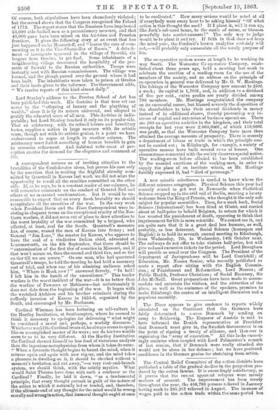The co-oporative system seems at length to be working- its
way South. The Worcester Co -operative Company, estab- lished about three years ago, held a meeting last week to celebrate the erection of a reading-room for the use of the members of the society, and an address on the principle of co-operation in general was delivered by Mr. Cr'. W. Hastings. The takings of the Worcester Company now amount to 250/. a week ; its capital is 1,7001., and, in addition to a dividend of five per cent., extra profits are yearly divided among 700 members. Mr. Hastings congratulated_ the company on its successful career, but blamed severely the disposition of the shareholders to take their annual dividends in money instead of in additional shares, thereby preventing any in- crease of capital and extension of business operations. There are 500 co-operative societies in the kingdom, and their total receipts for last year were 2,000,00.0/., of which 150,000/. was profit, so- that the Worcester Company- have more than attained the average measure of prosperity. There is scarcely a department of labour or trade in which the principle can- not be carried out ; in Edinburgh, for examp!e, a society of operative masons have built several rows of houses. One circumstance connected with the soc!ety deserves special notice. The reading-room before alluded to has been established by the unaided exertions of the working-men, in order to supply the place of an institute which, as Mr. Hastings forcibly expressed it, had "died of patronage."






























 Previous page
Previous page